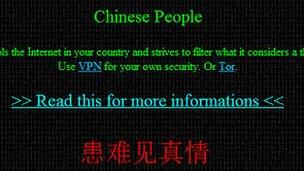Chinese websites 'defaced in Anonymous attack'
- Published

Defaced pages urged Chinese people to stage their own protests
The Anonymous hacking group claims to have defaced almost 500 websites in China.
Targets hit in the mass defacement included government sites, its official agencies, trade groups and many others.
A message put on the hacked sites said the attack was carried out to protest against the Chinese government's strict control of its citizens.
It urged Chinese people to join Anonymous and stage their own protests against the regime.
Attack pattern
The announcement about the defacements was made via anAnonymous China, externalaccount that was established in March.A list of the 485 sites affected was, externalput on the Pastebin website. Separate Pastebin messages posted email addresses and other personal details stolen when sites were penetrated.
Sites defaced had the same message posted to them that chided the nation's government for its repressive policies.
It read: "Dear Chinese government, you are not infallible, today websites are hacked, tomorrow it will be your vile regime that will fall."
China has one of the most comprehensive web surveillance systems in the world, known as the Great Firewall of China, that reinforces its broader social controls. The system polices where Chinese people can go online and tries to restrict what they can talk about.
On defaced pages, the Anonymous attackers also posted links to advice that could help people avoid official scrutiny of what they do and say online. Much of the advice was in English so it is unclear how much help it would be.
There has been no official confirmation of the defacements. News wires reported that government officials had denied any had taken place.
However, many of the sites listed are now offline and a few others displayed a hacked page for a long time rather than their own homepage.
The Anonymous hackers reportedly successfullyattacked some sites a second time once the original defacement was cleaned up, external.
- Published9 March 2012
- Published2 April 2012
- Published30 March 2012
- Published12 March 2012
- Published12 July 2011